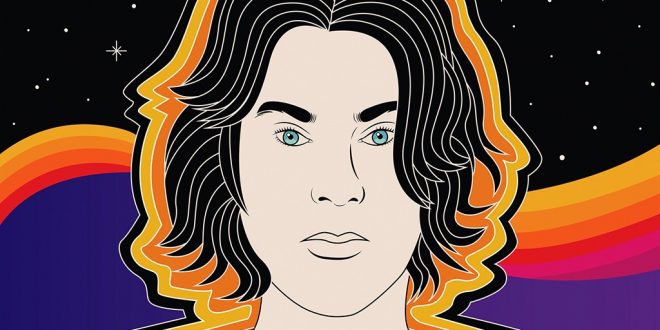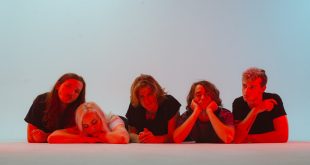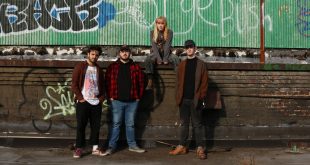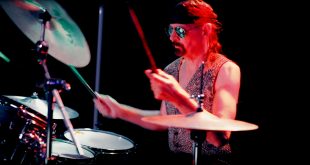A while back, Bill Majoros reached out to me to check out “All the Love You Give,” the latest single from his solo project, The Foreign Films, which will carry his seventh album, Starlight Serenade (out July 29th). Majoros appreciated my review of the song, and, once we’d established contact, was open to following the review up with an interview. We discussed his formative experiences, in terms of musical exposure and as a working musician in the Canadian band scene, further context of his new music, as well as what he has gleaned from putting his career in perspective.
When you were growing up, what was your musical environment like?
I’m in Hamilton, Ontario, which is between Buffalo and Toronto, essentially. I was an only child but got deep into music, and my folks weren’t musicians but loved listening to it, so there were records around. My dad loved big band jazz, and old school country like Johnny Cash, and stuff like that. When I was a little kid, I started watching re-runs of The Monkees on TV. I’d be like, “Wow, these guys are having so much fun; they’re hanging out on the beach and driving dune buggies!” Then, my mum took me to a record store. The cool woman at the desk was like, “Yeah, The Monkees are okay, but you should check out this band,” and she hands me The Beatles’ Revolver album. I was like, “Okay, I’ll try that.” I was seven years old at the time and I had no idea who The Beatles were. When we went home that day and I listened to the album, I actually thought they were a rip off of The Monkees (laughs), but that album actually opened me up to the universe of music. Around that time, I also had other classic stuff, like a 45 of “Good Vibrations” by The Beach Boys, and my cousins also gave me records by Led Zeppelin, and of The Zombies, which I loved. From there, being an only child, that’s how I became a multi-instrumentalist. I started playing guitar, drums, and keyboards, and since then, I’ve wanted to make records that sound as good as the ones I’d listened to as a kid.
Your formative experience was in the 90s, having been the guitarist and main songwriter for the band Flux AD. Which kinds of things did you pick up from those early days?
Well actually, before Flux AD, I was in the band Altogether Morris. Here in Hamilton, the first real studio I went to was a place called Grant Avenue, which was owned by Daniel Lanois and his brother Bob. At first, I didn’t know how influential a producer Daniel was, but it turned out he produced everyone from U2 to Bob Dylan. He was one of the major producers of the 90s and was basically in our backyard; it was great serendipity! We had the good fortune of working with the Lanois brothers at Grant Avenue, and once I put together Flux AD, he helped fund our first album, Passive Aggressive, in 1999. Up until that point, we had been been touring quite a bit, and Passive Aggressive was a well-produced and organic representation of our live set that captured our sonics and energy very well. A year later, we released a sister EP called Obsessive Compulsive, and that was our experimentation in the realms of electronic music. I feel that both releases captured the creative zeitgeist of the moment, while the peak of our musical journey had to have been with our 2002 album, Transatlanticthoughts; that one ended up winning Alternative Album of the Year in Hamilton. It was a really exciting time to be in that band, since the Canadian indie scene was exploding with creativity!
In terms of what I learned from that early period, I’d say one of the first things I’d carry over into my future material is a sense of studio craft, which I’d take part in utilizing while in Altogether Morris on our album Big Boots. We’d essentially use the studio as an instrument, and that involved learning about atmospherics, and capturing the emotions and chemistry between us in the studio. After Altogether Morris, I was in the band Universal Honey, and my experience in that band allowed me to tour all around Canada as well as the States. That was my beginning of exploring those types of places.
When you were in Flux AD, you even got to tour with The Tragically Hip, too, is that right?
Actually, in that band, we had the same manager and publishing company as The Tragically Hip. I wasn’t sure how aware people in the States would be of the Hip. They’re huge here in Canada.
Yeah! Well, I’m aware of the brief regional success they had here in the US back in the day, and then I also know them as a music fan. I’ve heard of the Hip, and also, Blue Rodeo, 54-40, Sloan, and a bunch of 90s bands who were on the Sonic Unyon record label. There’s actually a whole documentary about the Sonic Unyon scene, called Now We Are 25.
Right! It’s interesting you know that much about it. Sonic Unyon is from my hometown, and we’ve worked with them back in the day. The bands and people there are good friends of ours, and even though we were involved with different labels, we’re still part of a tight-knit community. I’ve recorded with some of the Blue Rodeo guys, and I’ve worked with 54-40, too. Any band you’d think of, I’d probably done a show with at some point (laughs).
The sense of community is something you don’t really get in America. Sometimes, we tend to be aloof, and we hate each other (laughs).
(Laughs)! I’ve always enjoyed playing America. I think the thing is though, with Canada, it’s a large country geographically, but there aren’t as many people. It’s roughly the same population size as California, right? So, based on that, I think the community is a little closer. I found that a lot of my friends here have played on each other’s records. My friend Kim Deshamps, who plays pedal steel in Blue Rodeo, has worked with me before, and now he lives in Texas. There’s a lot of cross pollination from band to band. But generally, I’ve had a lot of good experiences in America, too. I’ve played most of the major cities, and every time, it’s been great, to be honest.
That’s awesome! On the topic of collaborative projects, your most recent endeavor is The Foreign Films. How did the concept for this project come about?
Well, for the most part, The Foreign Films is me, more or less. I am The Foreign Films, either solo, or alongside some friends of mine that I work with on a regular basis. How this came about was from my time with the band Universal Honey, and we’d done a lot of touring in the States with Goo Goo Dolls and Alanis Morissette back in the day. I was playing drums in that band, but at the same time, I was also getting very deep into songwriting – keyboard playing and guitar playing, but still playing drums at heart. I wanted to create cinematic pop or rock songs – songs telling stories that were character-driven, had different points of view, and were almost like mini movies. So, after Flux AD disbanded in 2004, I created a project called The Foreign Films. My first album under that name was a double album, Distant Star, which came out in 2007. Around this time, I also played my first shows in the UK, with this project as a full band, and since then, I’ve continued recording and performing under the Foreign Films name with various lineups. On my follow-up album, The Record Collector, I featured one of my best friends, Dave DesRoches (better known as Dave Rave) on the song “The Sun Will Shine Again.” He originally sang in the band Teenage Head, who are essentially the Canadian equivalent of the Ramones. On The Record Collector, as well as the next album, Ocean Moon, and my new album, Starlight Serenade, which we’ll get to, I collaborated with Steve Eggers. He’s another one of my best friends, and I’ve also played guitar on three albums of his band, The Nines. I’m also working with a great bassist and producer named Carl Jennings, my friend Jason Frederick, who provides some string arrangements, from London, England, and Rob Preuss, who plays the synths – a super talented guy who used to play in another Hamilton band, The Spoons, who’s now based in New York City. Due to the Covid situation, we’ve all connected with one another through the magic of the internet, and we’ve done a bunch of records together.
That’s a whole host of awesome people! Going back to your first album, I see that Distant Star was also nominated for Album of the Year. That must have meant a lot!
It did; it was very meaningful. It makes me think about some of the records I used to listen to as a kid, which happened to be double albums. It’s quite the contrast from what other bands are doing, with everything being singles, and listeners having a shorter attention span. But I wanted to give them an experience similar to those albums I grew up with, like Quadrophenia by The Who, or All Things Must Pass by George Harrison – albums they can listen to with their headphones and be taken into another world. But it did mean a lot to get nominated, and I think I was also up for Best Guitar Player of the Year, too, which was very flattering. I appreciate it, and it’s nice to be recognized.
A decade prior, the Sonic Unyon bands were king – like Tristan Psionic, Smoother, Sianspheric, and others, but in the 2000s and beyond, you once again saw more local bands become popular worldwide. Being a Canadian musician yourself, what are your thoughts on the international acceptance of Canadian music over time?
It’s a very interesting topic. With my own music, I’ve gotten a lot of local acceptance, but also, I’ve noticed that many of my sales come more so from places like the States and Europe. Sometimes that level of acceptance depends on the genre you’re playing, as well as your music’s ability to transcend the borders. Relative to the size of Canada, there’s been a bunch of incredible artists over the years. Back then, artists like Joni Mitchell, Neil Young, Leonard Cohen, and The Band, all had to move out of Canada and into the States, and have made a tremendous impact. In the 2000s, bands like Arcade Fire made a big impact locally as well as in the world. In the most optimistic way, there’s that sense of community and a very good spirit to Canadian music. But on the other hand, I think music is a universal language that hopefully transcends those barriers. I love music from all around the world, and I put my heart and soul into trying to make good records. Stuff from my new record, Starlight Serenade, has charted in the States, but also in places like Mexico and Norway. You’d just want to get your music out there in the world. If your next-door neighbor loves it, that’s beautiful, but sometimes your neighbor takes you for granted, like, “Ah, that’s just Billy making a racket over there,” whereas in a place like Iceland, they might love it.
Factoring in that musical appeal, we move onto your most recent work with Foreign Films, “All the Love You Give.” What was the approach for that single?
Chronologically, after doing another EP, I did The Record Collector, and the vinyl set was a massive undertaking with full artwork and 28 songs. Then, in the beginning of 2019, I did Ocean Moon. I think one of the good things about the Covid situation is that its restrictiveness helped my creativity, since I’ve been able to do double and triple albums. With the new album, Starlight Serenade, “All the Love You Give” is the most recent single off that.
I guess to answer your question in a roundabout way, with this new album, I wanted it to be more concise. “All the Love You Give” has a Twilight Zone premise – a woman goes back in time and wakes up in the 1960s, and is given a chance, in a fantasy way, to relive her life. She decides to kind of go down the path less trodden and chase her dreams a bit more. I wanted to tell a good, concise, interesting story, without that expansive, triple album format, and instead, within the span of three to four minutes.
I love how you provided context leading up to the creation of the single. From what I gather, she wakes up in the latter part of the 60s, which I think is where the song’s influence comes from, and aims to not only improve herself, but to restore a sense of happiness within that otherwise grim period, essentially.
You exactly get it; that’s completely right! When you flip it in a modern context, the song is about shining a light in these dark times. You’re right – things weren’t always rosy or ideal back then. There’s always challenges in every decade. As you get older and the world gets crazier, you’re always trying to keep that sense of wonder alive, and bring beauty into the world through art. That’s been my mantra.
As I understand, Starlight Serenade as a whole is a collaborative effort. Like you’ve mentioned before, you worked with two of your best friends, Dave Rave and Steve Eggers, who do backing vocals, Carl Jennings is the bassist and co-producer, Jason Frederick does the strings, and Rob Preuss, from The Spoons and also Honeymoon Suite, does the synths. That must have been surreal to have worked with such legends!
Yeah! I mean, Carl is a great bassist – one of the most talented musicians I’ve ever played with – and a lovely guy. He’s a great singer, too, and does a lot of background work. So, typically, I’ll bring a song over to him, and he’ll immediately come up with a great bass line. Then I’ll play guitar, and then once I hop on the drums, I put on my headphones, close my eyes, and pretend I’m playing a show. I don’t mind modern technology, but we’re really trying to keep a live feel. We keep in the humanity, and try not to use too many things like Auto Tune; that’s for other people. Speaking of legends, like Rob Preuss, for example, I used to hear his band The Spoons on the radio as a kid, and they were the first I heard use synthesizers. They had big hits around here. To put that in perspective, they were like a Canadian version of the band New Order, and they made very legendary new wave stuff out of this area. It really was an honor to work with him. Jason, who I’ve known for years, is also from this area, and he had subsequently moved to LA to do film composition, while I was in London. Dave is a very enthusiastic person, and he and I have played on each others records before. Back in 1992, he did a fantastic solo album with the Dave Rave Group called Valentino’s Pirates, which was a huge influence on me. Since we’ve taken the time to play together, he’s been very supportive of The Foreign Films. And Steve is a brilliant singer, songwriter, and musician He’s been putting out fantastic records since the 90s with The Nines, and has contributed backing vocals on various Foreign Films songs, including one from the new album, “The Mystery of Love.” Yeah, all these guys are legendary in their own right, and beautiful people. I’m really lucky to work with them!
Regarding the success of “All the Love You Give,” when I was first made aware of its performance, it reached number one on Radio Candy in Los Angeles, and number two on KOR FM in the UK, and that’s not even the end of it; it just keeps on going! Does that still take you aback, like, “Oh my God, we’re blowing up now guys!”
Yeah, it’s really nice! At the end of the day, you’d want to communicate the music to as many people as possible, and it’s just beautiful to know that your music is getting played around the world. Last it charted, there’s a thing called the Music Indie Alliance, who surveyed around 75 stations from around the world, and it was number one this past week, so I’m super excited about that. Interestingly enough, another one of my older songs, called “Katie and the Crystal Hearts,” from Ocean Moon, started getting airplay. I guess they went back and wanted to check out the older stuff, and I appreciate that. It’s the kind of thing where I think, “Man, if this happened to me when I was a 12-year-old kid, my mind would be blown,” and I guess it still is blown even today. I’m really thankful when people, including yourself, really take the time to listen to my music. There’s a lot of stuff out there, and we try to put heart and soul into it and make the music we’d love to make. When it does well, that’s beautiful – it really is.
As far as how “All the Love You Give” fits into Starlight Serenade, is this song part of a series of vignettes, or is it its own story?
That’s a good question! Maybe because I like the idea of concept albums, like I’ve done with Distant Star and The Record Collector, I guess the loose theme here is trying to keep magic alive in dark times; that would be the defining thread. Yeah, there are vignettes in this album, more or less. There’s another song on the album called “A Photograph of You.” While in my folks’ house, I stumbled upon some photo albums. My mum had passed away not too long before that. But a year ago, I was looking through some old photos, and there were a lot of people in them that I didn’t know personally, so I started to imagine my own stories around them. Maybe there’s an element of time travel in the album – being able to go back, and that energy is captured in those black and white photographs. You ask yourself, “What were these people feeling? What did they do in life?” These people were 20 years old or something, and you’re curious about their stories. So, in that song, I was trying to fill in the other elements of it. There’s another song called “The Fortune Teller”, which is about serendipity – how one thing, whether based in good luck or bad luck, leads to another, how luck is sometimes simply thrust upon you, and how you make the most out of life. (Sings), “The fortune teller says the stars will align/I said, ‘Darlin’, won’t you give me a sign?’” It’s just an imaginary story, but there’s themes of fate and mysticism. Hopefully not in a corny way (laughs), but just the idea of how those things affect our lives. There are also a couple songs that are a bit darker and are influenced by Hitchcockian thrillers, but I also try to bring characters to life in these songs.
Based on what I’ve heard so far, it is really expressive, and definitely resonates with me.
That’s the main goal. When I was a kid, there was a thing I heard about Brian Wilson, where he wanted the listener of his music to feel warmth, loved, and to feel good. So, it means a lot to me that my music resonates with you.
That actually follows my next question. Similar to how Brian Wilson wants the listener to feel, how do you feel after making this album?
Well, that’s another good question. It feels like a release. When I think of the term “record release,” I feel it quite literally. It’s like having these kids, sending them out into the world, and hoping they do okay. You hope they flourish and that they do good things. You want your music to bring joy and a little bit of happiness. So, it feels good, and considering this whole situation, I’ve been writing every day. Every morning, I get up and write ideas. Once those songs are finished and released, it feels like the closing night of the play. Ironically, this new album still has yet to be released, so hopefully, it’ll take on a new life once I get to play live again. So, in that way, it feels like you’re getting ready for the next phase of a triathlon, like “Okay, the record’s done, and now it’s time to play live!” During my time in the UK, I played several solo Foreign Films shows in this venue in Liverpool called the Cavern Club in 2012, a few years after Distant Star came out, and also played separate shows with Dave Rave Group as their drummer. That has been one of my all-time favorite venues to play! I’m hoping to go back there soon, and also get down to the States. At the end of the day, I feel thrilled when someone like yourself likes my music.
As a singer-songwriter myself, I recognize that you have to be okay with any reaction, be it positive, critical, or even the trolling, out of place response.
Yeah, exactly. It’s an honor if someone likes your music, but either way, you just need to make the best music you can, and in a Zen Buddhist kind of way, find that happiness within yourself. Being a singer/songwriter, and I’m sure you can relate to this, I love playing guitar and writing songs, just because that’s what I do, but it’s icing on the cake if someone else happens to like them.
Considering your career thus far, what have you learned about yourself, both as a musician, and as a person?
I’ve learnt that my forte is in creating songs and songwriting. I’m at my best when I push myself and I always try to be better. I feel content in the moment, but at the same time, I’m hoping this new album is the best one I’ve ever done. That’s what I’ve recognized as a musician – to be better, not necessarily as a means of being technically fancy, but in conveying emotions more clearly. As a person, I realized that I’m incredibly thankful, because I’m lucky to have met the musicians I’ve worked with over the years, I’ve made good friends, and have had so many new experiences traveling. I’ve played with some big bands but I’m still a working musician. I’ve learnt that the more you give, the more you get, and I count my lucky stars. I have great people around me – Kristie Ryder at Poppermost Prints with my album artwork, Carl, Jason, Dave, Rob, and Steve with my music, and Brian Hetherman at my record company. I’m very thankful for that.
Lastly, anything you’d like to say to your fans?
Thank you for taking the time to listen, and please feel free to reach out to me. You can find me at theforeignfilms.com, or email me at theforeignfilms@gmail.com. You can also find me on Facebook by typing my name, Bill Majoros. Just like yourself, if you like my music, I’d love to hear yours, too. Also, support local music. It really does help keep the wheels turning if you buy my record, but even taking me out of the equation, support your local art scene. Music adds so much to culture, and it’s the soundtrack of our lives.
The Foreign Films Socials:
 Music Existence Because of Music, We Exist
Music Existence Because of Music, We Exist




